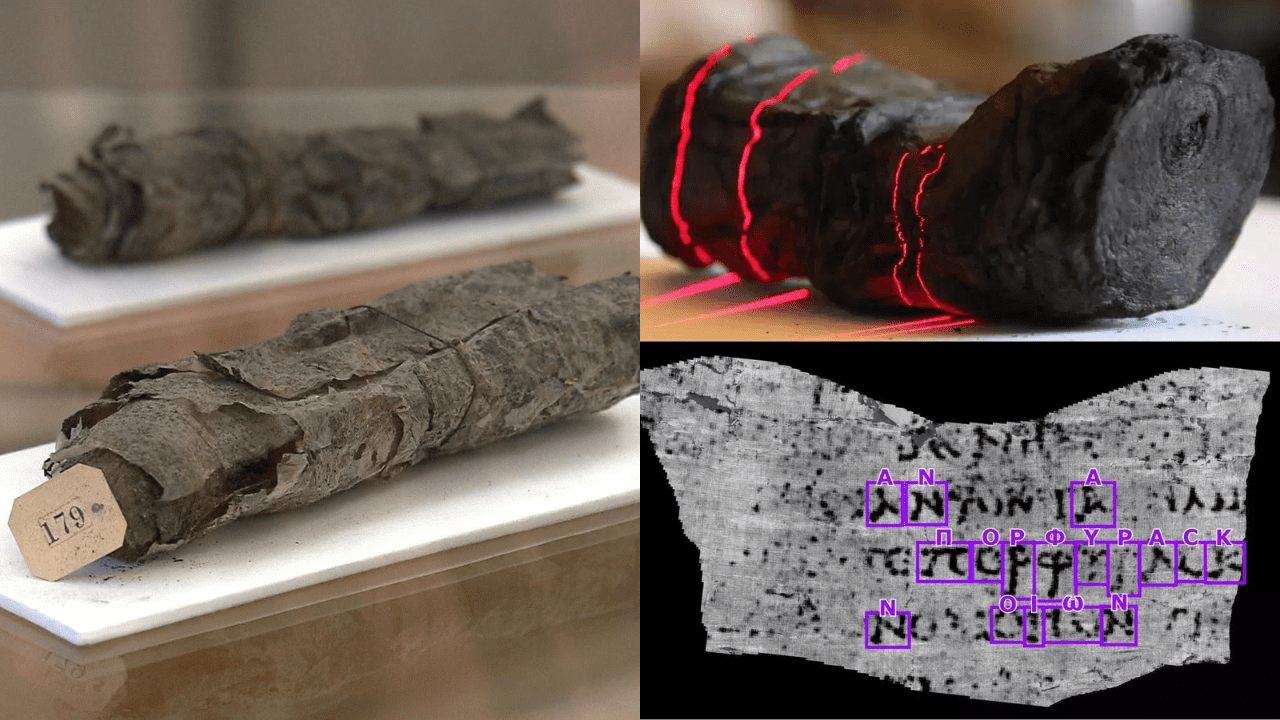AI Reveals Secrets Written On A 2000-Year-Old Greek Scroll!
Technology truly breathes life into our historical past. A young visionary has made a breakthrough, twisting the ancient with the modern. He has decoded words carved into a nearly 2000-year-old scroll without even opening it. Let’s delve deeper into this extraordinary achievement. The Backstory: Ancient Scrolls and a Volcano It all started in AD 79 when Mount Vesuvius erupted, burying the town of Herculaneum alongside its more famous counterpart, Pompeii. Among the buried treasures of Herculaneum were papyrus scrolls, rich with academic and philosophical wisdom. Unfortunately, the same eruption that preserved them also made them virtually unreadable. These fragile scrolls were discovered in 1752. But they’ve been sitting mostly untouched. The scrolls were considered lost, having turned into brittle. These are charred artifacts due to…
Technology truly breathes life into our historical past. A young visionary has made a breakthrough, twisting the ancient with the modern. He has decoded words carved into a nearly 2000-year-old scroll without even opening it. Let’s delve deeper into this extraordinary achievement.
The Backstory: Ancient Scrolls and a Volcano
It all started in AD 79 when Mount Vesuvius erupted, burying the town of Herculaneum alongside its more famous counterpart, Pompeii. Among the buried treasures of Herculaneum were papyrus scrolls, rich with academic and philosophical wisdom.
Unfortunately, the same eruption that preserved them also made them virtually unreadable. These fragile scrolls were discovered in 1752. But they’ve been sitting mostly untouched. The scrolls were considered lost, having turned into brittle. These are charred artifacts due to the intense heat and gases from the eruption.
Young Student Changes The Game!
21-year-old Luke Farritor, a student from the University of Nebraska–Lincoln, has done the impossible. Luke faced the Vesuvius Challenge. The challenge requires participants to decipher ancient scrolls. But they should do it without actually opening them.
Luke’s approach Used AI. More specifically, he used a machine-learning algorithm that reads the scrolls by identifying differences in the surface texture where ink might have been applied.
A Word from the Past
Through AI, Luke managed to identify several letters. He also identified a full word from the scroll: “πορφυρας” (porphyras). This Greek word translates to ‘purple’, a shade often linked to royalty in ancient times.
It’s not just about the word, though. This marks the first time in centuries that we’ve got a glimpse into the content of these scrolls. For his efforts, Luke earned himself a cool $40,000.

What’s Next?
Now, with one word out in the open, it feels like we’re on the edge of something big. Federica Nicolardi, a classics professor, suggests that there’s much more waiting for us. There could be stories, philosophies, and maybe even texts we didn’t know about.
Brent Seales, a computer scientist, is hopeful about what we’ll find – writings that might reflect our very human experiences, thoughts, and emotions.
Moreover, the technique isn’t limited to just these scrolls. Who knows what other historical documents we might decipher next?
Conclusion
It’s stories like these that remind us of the exciting place where history meets technology. Through the curiosity and innovation of people like Luke, the past is getting a bit clearer, one word at a time. And as we uncover more, who knows what other surprises and insights await?
Also read,






